fode kaba
King, Anthony P. 1974. "Musical Tradition in Modern Africa." Journal of the Royal Society of Arts 123 (5221): 15-23.
(Fode Keba)
p. 20
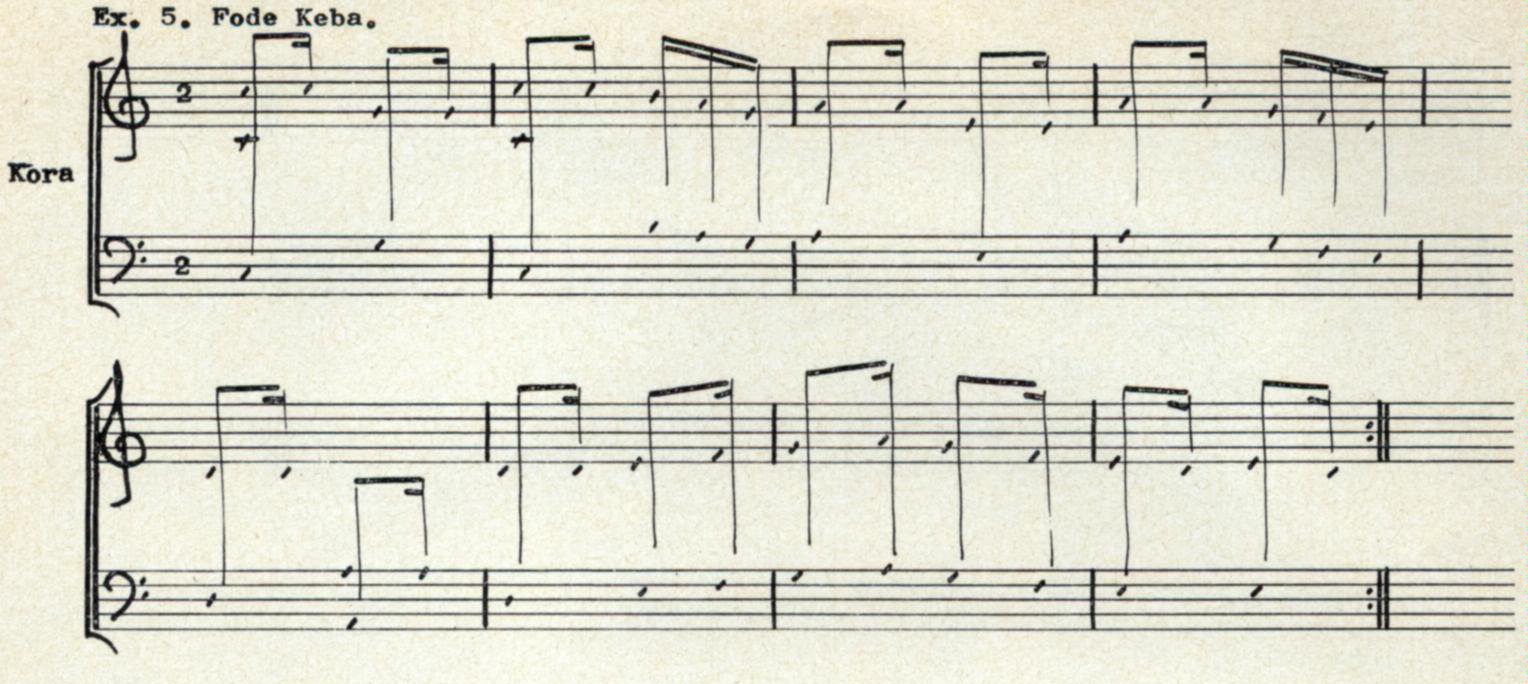
Jobarteh, Amadu Bansang. 1978. Master of the Kora. Eavadisc, EDM 101.
(Fode Kaba)
This piece, in Hardino tuning, is well-known to all kora players, and is one of the easier pieces in the repertoire. A version of it has been adapted for the Gambian National Anthem. Fode Kaba is a rather controversial figure in Mandinka history. A prominent marabout of the mid-19th century, he was one of the key figures in the 'soninke-marabout' wars between devout Muslims ('marabouts') and non-Muslims or lax Muslims ('soninkes'), especially those who drank alcohol. In the course of establishing control over an ever increasing area, he came into conflict with King Musa Molo, and also with the colonial powers, with whom he was already unpopular for plundering soninke villages. Fode Kaba was gradually driven into retreat by both the French aod English, and was fmally killed at Medina; his wives were blown up in an explosion of gunpowder.
Although the musicians are not uncritical of his ruthless measures, they praise him for his religious fervour and for the number of converts he was able to make during his lifetime. Here Amadu sings the refrain only, which includes one of fade Kaba's praise names.
Fode Kaba,
Lalo Fode,
You have converted the pagans, Lalo Fode.
Pevar, Marc, prod. 1978. Gambia's Music. Vol. 1. Folkways, FE 4521.
(Fode Kaba)
The subject of their song is the Muslim Fode Kaba, a turn-of-the century Mandinka leader whose fighting in the provinces of Fonyi and Kiang caused trouble for the British colonial government.
Sanneh, Lamine O. 1979. The Jakhanke: The History of an Islamic Clerical People of the Senegambia. London: International African Institute.
(Fode Kabba)
pp. 193-5
Fode Kabba Doumbuya (d. 1911), the Senegambia mujāhid, opened his military operations with a request to the Jakhanke clerics to perform al-istikhārah for him. There is an abundance of material in oral sources. Fode Kabba was himself of Jakhanke stock. His mother's father was Jaghun Fade, also known as Jagha Salimu, of Didécoto, Bundu, the brother of Karamokho Ba. Fode Kabba's mother was Hawa Gassama.16 He and his father, Bakary Doumbuya, left Bundu-Gumbael and came to Niani-Tantukunda where Fode Kabba was placed under the personal tutorship of Simoto Kewo (see Map 5). His father left there and travelled to Niani-Dobo and to Kerewan-Dumbokono, Fuladu East. Bakary Doumbuya carried on some commercial activity alongside his normal teaching functions, and when he came to Fuladu East he took control of a transit port called Pirifu on the river Gambia, now no longer extant. By assuming control of Pirifu, Bakary Doumbuya came into direct conflict with the commercial oligarchy of neighbouring Chakunda. The people of Chakunda forced their way into Pirifu to collect customs dues and Bakary Doumbuya and his party turned them away. Incensed at the way they were treated, the people of Chakunda resolved to bring force to bear. An attack was launched against Firifu which was successfully resisted. At this point Bakary Doumbuya asked the Jakhanke clerics of Bundu to perform al-istikhārah for him and advise him of what the future held in store. The results predicted that conflict on a major scale was inevitable and Bakary Doumbuya was advised to take certain precautions, including making an offering of a slaughtered bull. Soon after that a second attack was launched against Pirifu which met with the same fate as the first one. At this point Fode Kabba joined forces with his father and together they sacked Chakunda and a number of other towns in the Upper Gambia region. At Songkunda, however, they met with stiff resistance and were repulsed. Fode Kabba then turned to Alfa Molo, the Fula warrior, for support, and a precarious alliance was formed which soon failed.17
Although the Jakhanke performed prayers for Fode Kabba and his following, they refused to take part in military operations because of what was described to me as a fundamental scruple that Fode Kabba's military operations had none of the characteristics of a jihād and that even if such operations could qualify as one the Jakhanke would not be able to provide material support beyond a token blessing. They were prepared to see the early stages of the conflict as preventive action (Jakhanke: monebai) but were reluctant as a group to endorse the later stages.17 But this attempt to make a neat and sharp distinction between preventive war and offensive operations may represent a mythical ideal rather than practical reality. The Jakhanke have had plenty of time to work out such a theory.
According to another oral account, before opening his operations Fode Kabba appealed to the Jakhanke for support, including the performance of al-istikhārah. To justify this appeal to his fellow Muslim Jakhanke, Fode Kabba compared his career to that of the Prophet at Medina. His daily regime was self-consciously Muslim, strict adherence to the five daily prayers, an observance of Muslim dietary rules (such as a prohibition on consuming carrion or flesh not properly bled according to rules of dhabah, pork, and reptiles), and a ban on alcoholic drinks. A Jakhanke cleric, Fode Bakary, from the Darame qabīlah, was adopted by Fode Kabba as his war chaplain. At a critical stage in the proceedings when Fode Kabba, shunned by most of the Jakhanke, which much depleted his moral and spiritual reserves, faced the combined fire of the English and the French and defeat was inevitable, a number of people were evacuated from Medina (Fogny) to Morikunda (Casamance). These included Buraima Doumbuya, Fode Kabba's eldest son, Sidiya Darame and Sa Jimmo Darame, both sons of Fade Bakary Darame. Sidiya Darame was later fetched from Morikunda by a relative of his, Ta Mbemba, and came to settle in Danfakunda, Upper Gambia, where he became the leader of the Jakhanke clerical establishment.18
16 Charlotte Quinn is confused about Fode Kabba's family background. She says his family 'were [sic] Jakhanke Mandingo, a people from Futa Tuba who spoke a dialect of Mandingo different from that of their neighbours in the Gambia states' [sic] (1972: 172).
Knight, Roderic. 1982a. "Manding/Fula Relations as Reflected in the Manding Song Repertoire." African Music 6 (2): 37–47.
(Fode Kabba)
p. 39
Table One . . . includes the best known, most often heard, or otherwise significant songs in the [Gambian] repertoire. In each column the top few songs are the oldest, and the bottom few are the youngest. The majority in each case fall somewhere in between (often in the nineteenth century), but no chronological ordering beyond this is intended, since it is often not possible to date a song exactly. Most of the songs bear the name of their owner as the title. Where they do not, his name is shown in parentheses next to the title. The letter code at the right represents the person's "claim to fame" or calling in life, as shown in the bottom of the list.
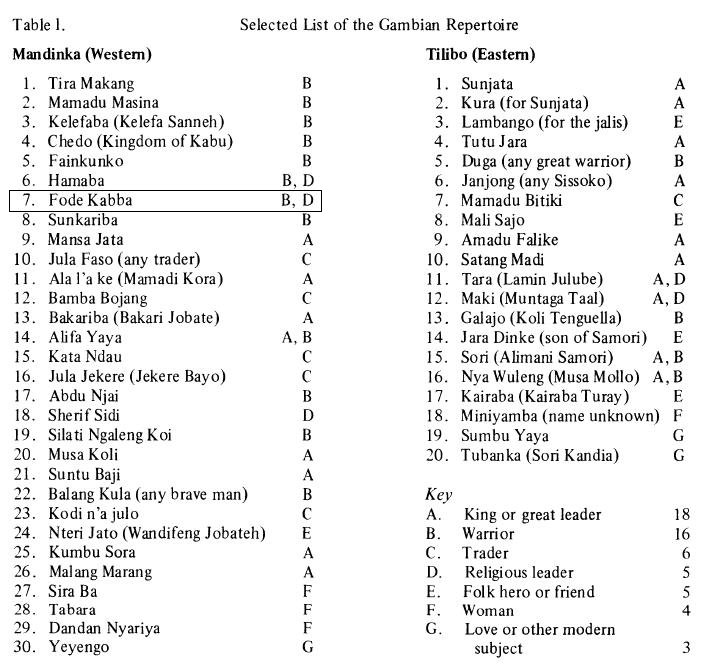
p. 40
Table Two shows the same fifty songs again, grouped this time by the ethnic background of the people commemorated.
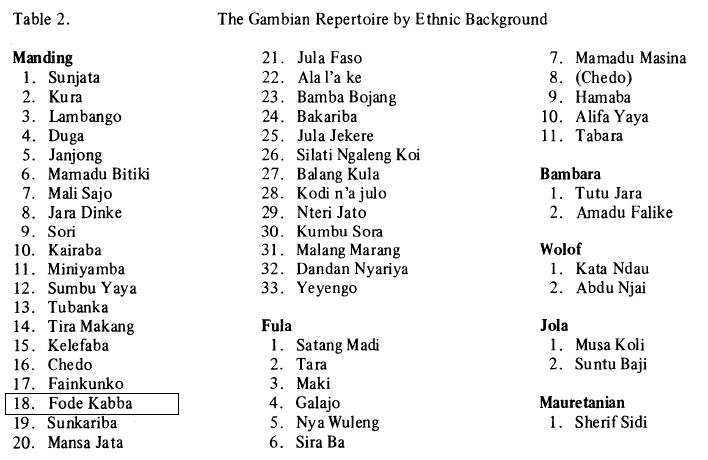
Jessup, Lynne. 1983. The Mandinka Balafon: An Introduction with Notation for Teaching. La Mesa, Calif.: Xylo.
(Fode Kabaa)
pp. 146–59 (Appendix 2: Balafon Repertoire)
| Title | Fode Kabaa |
| Translation: | Name |
| Dedication: | Fode Kabaa Dumbuya |
| Notes: | dev. into the national anthem |
| Calling in Life: | Warrior, Religious leader |
| Original Instrument: | Kora |
| Region of Origin: | Manding (Western Coastal Region) |
| Date of Origin: | M (19th & 20th c. up to WWII) |
| Sources: | 1, 3 (Jessup & Sanyang, R. Knight 1973) |
Knight, Roderic. 1984. "The Style of Mandinka Music: A Study in Extracting Theory from Practice." In Selected Reports in Ethnomusicology, vol. 5, Studies in African Music, ed. J. H. Kwabena Nketia and Jacqueline Cogdell Djedje, 3–66. Los Angeles: Program in Ethnomusicology, Department of Music, University of California.
(Foday Kabba)
p. 9
Two famous leaders of the nineteenth-century Gambian jihad (Islamic holy war), Maba and Foday Kabba, each have their own songs (Schaffer & Cooper 1980:78). The basic donkilo for "Foday Kabba" is as follows: "Foday Kabba, the pagans have converted. Foday of Mbankali, marabout and kind unto himself."
p. 19
Melodically we may discern three types of kumbengo, based on their relationship to the donkilo.
Type I: Parallel. . . . In this type, the kora player duplicates the voice part in octaves, plus an occasional fifth. Since technically any donkilo line may be accompanied in this way, some jalolu maintain that this is not a kumbengo at all, but merely a form of birimintingo, or instrumental variation. Still, some songs are traditionally accompanied in this way. "Miniyamba" and "Mali Sajo" (Exc. 7 and 8) are two of them. Another is "Foday Kabba," shown here (and heard on Tape Ex. 4).
Example 10. "Foday kabba," kumbengo and donkilo (Tape Ex. 4)
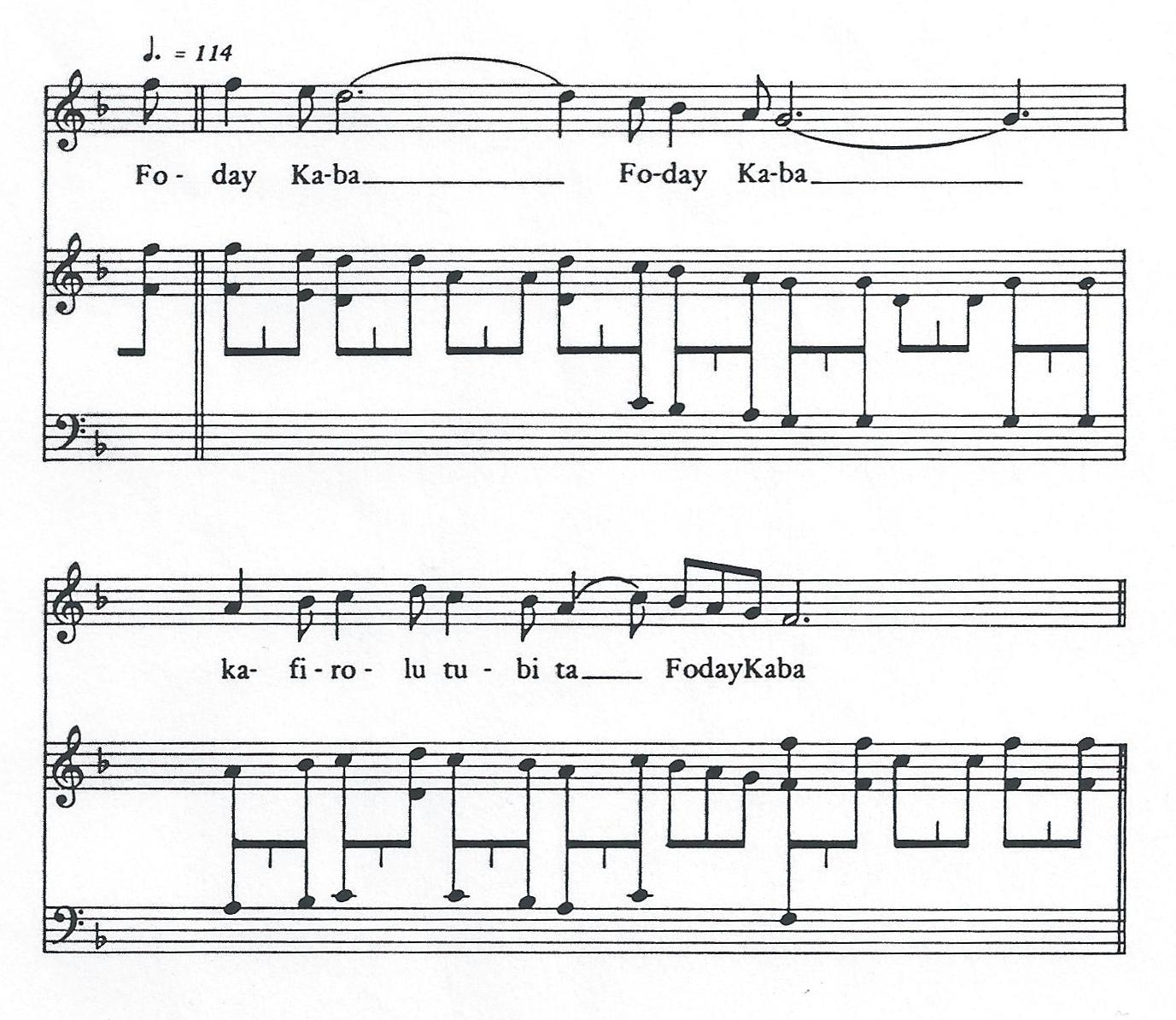
Jatta, Sidia. 1985. "Born Musicians: Traditional Music from The Gambia." In Repercussions: A Celebration of African-American Music, ed. Geoffrey Haydon and Dennis Marks, 14–29.
(FodeKabaa)
p. 23
Not all the pieces in the repertoire bear personal names as their titles, but most of them are named after the personalities for whom they were originally composed. Some examples of these are: FodeKabaa, Kelefaa, Saane, Saamoori, Alfaa Yaayaa, Mammadu Maasina, Satan Madi, Sirifu Siidi and Jula Jekere, all of which bear the names of historic figures.
Sadji, Abdoulaye. 1985. Ce que dit la musiqe Africaine.... Paris: Présence Africaine.
(Fodé-Kaba)
pp. 111–14
Fodé-Kaba était de Toula, dans le Diaha. Il était « Vali-You ». Un « Vali-You » est un saint qui comprend tous les mystères religieux et peut accomplir des miracles.
Il alla dans le Gâbou pour convertir le pays à l'islam, mais les gens de la contrée refusèrent, de se convertir, car ils avaient des fétiches puissants auxquels ils offraient du lait frais, du lait caillé, des veaux et des moutons ; des fétiches qui, depuis leur plus lointain souvenir, avaient toujours ratifié les voeux et les désirs des hommes placés sous leur tutelle.
Fodé-Kaba n'était pas connu au moment où il alla prêcher l'islam dans le Gâbou. Néanmoins il prépara de l'eau bénite qu'il alla répandre sur tous les arbustes de la brousse. Et les hommes qui entraient dans cette brousse mouraient aussitôt.
Les gens de Gâbou invoquèrent en vain leurs fétiches ancestraux, en vain ils doublèrent les rations de lait frais, de lait caillé, de veaux et de moutons. Les hommes mouraient toujours dès qu'ils pénétraient dans la brousse. Finalement ils consentirent à se convertir et devinrent tous musulmans pour éviter la mort et aussi parce que leurs fétiches se révélaient pour la première fois impuissants à guérir tous les maux qui pourraient tomber sur leurs têtes.
Avec les nouvelles forces que lui apporta cette conversion des gens de Gâbou, Fodé-Kaba constitua ses premières colonnes légères. Puis il alla dans Firdou, le royaume des Peuhls, qu'il somma aussi de se convertir.
Fodé-Kaba alla trouver Digori, le souverain des Peuhls, et ordonna :
— Je veux que tous tes sujets se convertissent et sachent qu'il y a un Dieu qui est le maître de tout.
Et Digori de ricaner et de refuser insolemment toute concession dans ce sens.
Fodé-Kaba livra bataille à Digori et, au cours du combat, Demba-Adiada fondit sur le chef des Peuhls et le fendit en deux avec son sabre. Demba-Adiada était le bourreau de Fodé-Kaba.
Tout le Firdou accepta de devenir musulman.
La force de Fodé-Kaba s'accroissant, il poussa plus avant ses conquêtes, alla dans le Fogny, dont le souverain s'appelait Bourounaye. Les gens de la contrée étaient des Diolas ; or, tout le monde sait que les Diolas, comme les Sérères, communiquent sans intermédiaire avec l'âme des ancêtres défunts.
Bourounaye, le prince des Diolas, dit à Fodé-Kaba :
— Je ne me convertirai qu'à une seule condition: c'est que tu fasses devant moi et devant le peuple assemblé quelque chose qui étonnera tout le monde et qui prouvera qu'il y a quelqu'un de plus grand au-dessus de moi.
C'était le jour. Fodé-Kaba fit venir la nuit instantanément. Mais le roi des Diolas était sceptique et ne pouvait s'étonner outre mesure de si peu de chose. Car ne faisait-il pas, lui, Bourounaye, descendre la pluie quand la sécheresse menaçait d'introduire la famine dans le pays de -Fogny ? Pour accomplir ce miracle, il n'avait qu'à faire danser le peuple dans des poses obscènes et cyniques, au son du taboula de détresse, ou bien exhumer un mort que les fétiches accusaient de détenir méchamment la pluie, quelque part dans la région de ses parties génitales.
Fodé-Kaba, se rendant compte de la mauvaise volonté de Bourounaye, lui déclara :
— Prépare-toi donc à me combattre. Et Bourounaye exulta :
— C'est tout ce que j'attendais.
L'armée de Fodé-Kaba, grossie par la récente conversion des Peuhls, livra bataille au roi Bourounaye, le prince des Diolas. Mais le combat dura moins de temps qu'il n'en faut pour le narrer.
Bourounaye fut tué par Demba-Adiada et tout le Fogny se convertit à la doctrine du vainqueur.
Ces conquêtes froissèrent l'amour-propre de l'Anglais, qui organisa une grande campagne contre Fodé-Kaba. Mais Fodé-Kaba le battit, s'empara de ses canons, tua un grand nombre de ses guerriers, prit les uns dont il fit des bergers et le reste des esclaves. Pendant neuf ans, il lui fit éprouver des pertes égales à celles que Samory infligea aux Français.
A la fin pourtant, l'Anglais eut le dessus, prit et détruisit le « tata » de Fodé-Kaba. Le Vali-You, sentant que tout était perdu, décida de mourir. Et désignant une place, il dit à son fils : « Il faudra m'enterrer ici ; que les femmes viennent chaque jour vanner le mil sur ma tombe, afin qu'il y pousse des épis et que l'Anglais ne sache jamais où je repose. »
Knight, Roderic. 1992. "Kora Music of the Mandinka: Source Material for World Musics." In African Musicology: Current Trends, ed. Jacqueline Cogdell DjeDje, 2:81–97. Los Angeles: African Studies Center, University of California.
(Fode Kaba)
pp. 84–85
The Gambian national anthem succeeds in retaining the balance and beauty of the traditional song Fode Kaba from which it was derived.2 The source material was chosen through a national competition in which the winning entry was a version submitted by the well-known kora virtuoso, Jali Nyama Suso. The song is for the nineteenth century Gambian leader Foday Kabba, famous for forcibly converting whole communities to Islam.
Example 3a. The melody of the traditional kora song Fode Kaba. Translation: "Foday Kabba, [sic] his own king, his own marabout" (holy man).

Example 3b. The Gambia national anthem, transcribed from a recording of the Gambia Field Force Band (Photo 1). The words have been underlaid from a separate source.
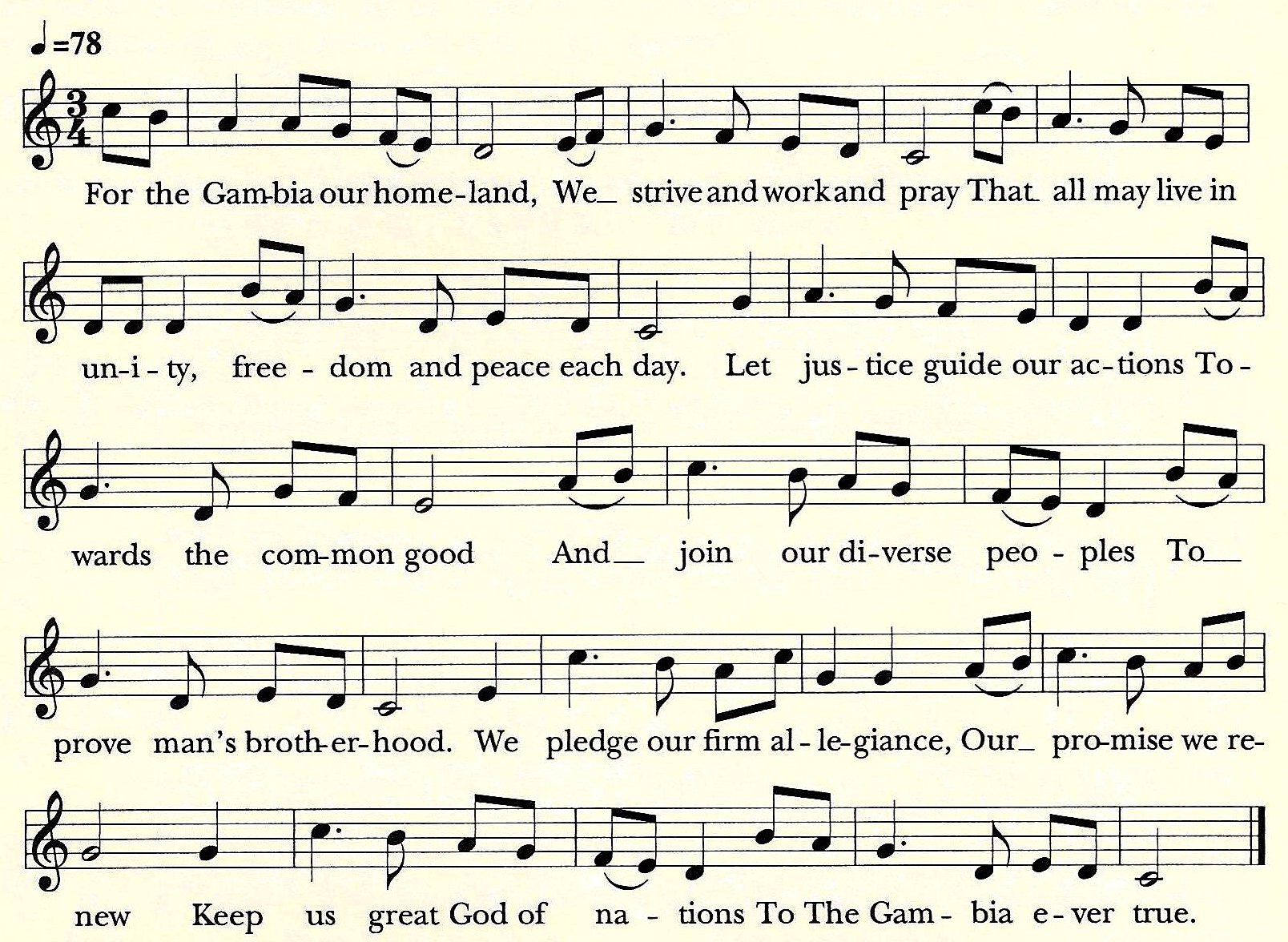
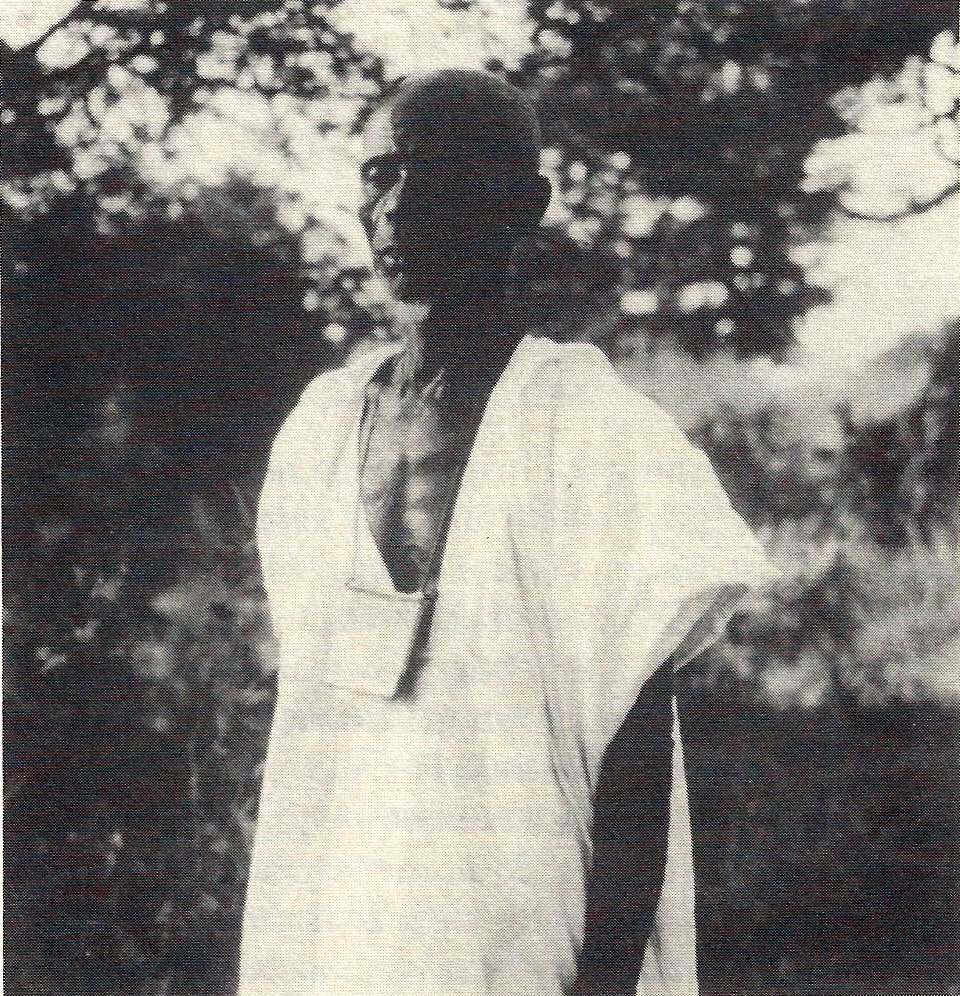
Photo 2. Musa Sanoba Dumbuya, son of Foday Kabba, standing on the site of his father's last fort, at Kerewan Dumbo-Kono.
2. A traditional kora performance of Foday Kaba may be heard as played by Amadu Bansang Jobarteh on Eavadisc 101, B-3.
Jobarteh, Amadu Bansang. 1993. Tabara. Music of the World, CDT 129.
(Fode Kaba)
Fode Kaba is the story of a great Mandinka leader of the last century who fought against French and British colonialists, and this piece commemorates his legendary life. Similar to Alfa Yaya (track #8), it is composed largely of a single melodic line which is played over and over again, and often enhanced by octaves.
Charry, Eric. 2000. Mande Music: Traditional and Modern Music of the Maninka and Mandinka of Western Africa. Chicago; London: University of Chicago Press.
(Fode Kaba)
p. 148
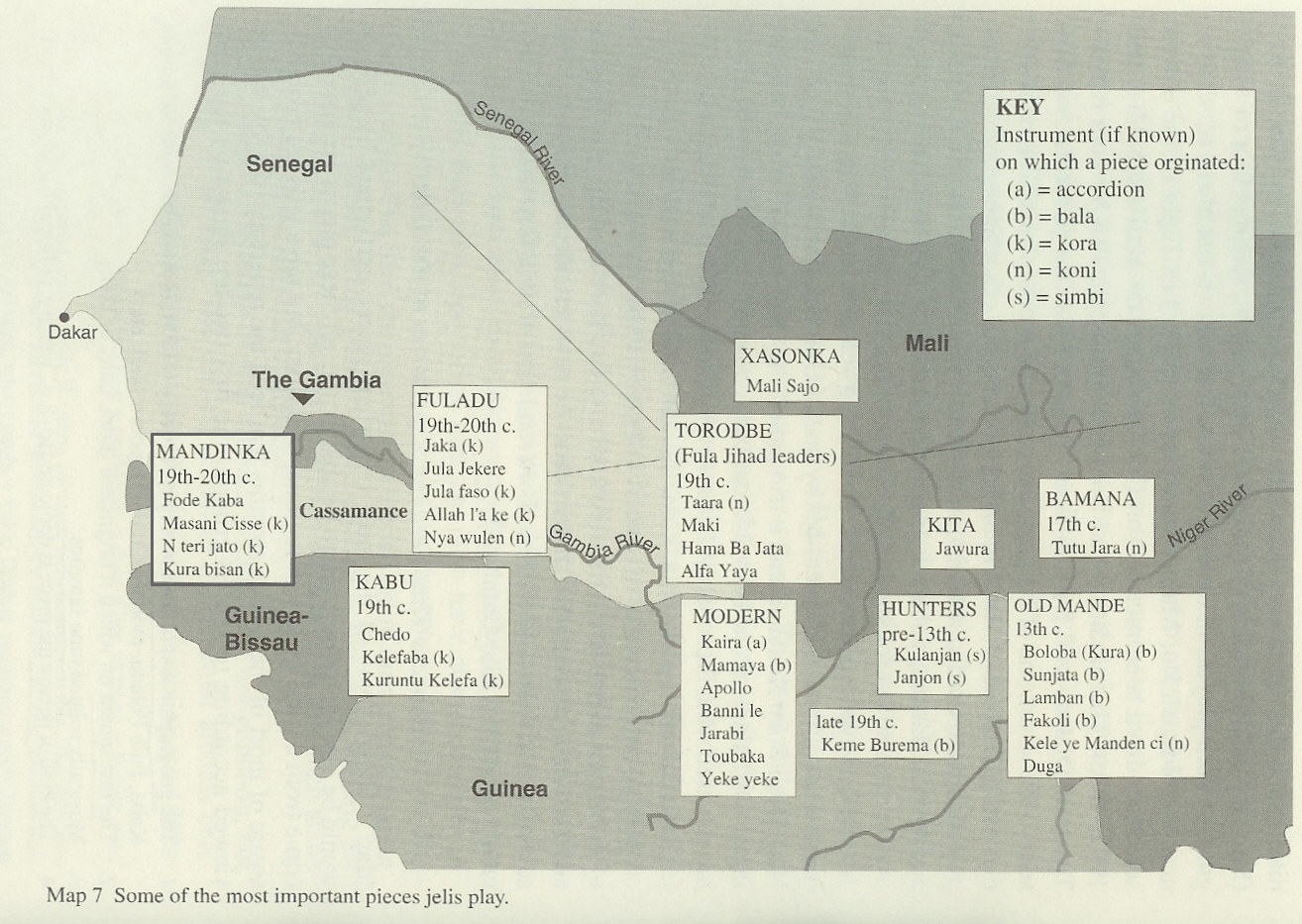
see also:
Innes, Gordon. 1976. Kaabu and Fuladu: Historical Narratives of the Gambian Mandinka. London: University of London School of Oriental and African Studies.